Government and Politics in the United Kingdom
1. Why doesn’t Britain have a written constitution?
3. How does Britain elect its government?
4. What are the origins of the names of the main political parties?
6. What is a ‘whip’ in Parliament?
8. The Monarch’s Role in Government
9. Devolution
10
11. Elections
12. Political parties in the United Kingdom
13. The Government
14. Local government
Why doesn’t Britain have a written constitution?
The British constitution has
evolved over many centuries. Unlike the constitutions of America, France and
many Commonwealth countries, the British constitution has not been assembled at
any time into a single, consolidated document. Instead it is made up of
common
law,
statute law and
convention. Of all the democratic countries in the world,
only Israel is comparable to Britain in having no single document codifying the
way its political institutions function and setting out the basic rights and
duties of its citizens. Britain does, however, have certain important
constitutional documents, including the Magna Carta (1215) which protects the
rights of the community against the Crown; the Bill of Rights (1689) which
extended the powers of Parliament, making it impracticable for the Sovereign to
ignore the wishes of the
Government; and the Reform Act (1832), which reformed
the system of parliamentary representation.
Common law has never been precisely defined - it is deduced from custom or legal
precedents and interpreted in court cases by judges. Conventions are rules and
practices which are not legally enforceable, but which are regarded as
indispensable to the working of
government. Many conventions are derived from
the historical events through which the British system of government has
evolved. One convention is that Ministers are responsible and can be held to
account for what happens in their Departments.
The constitution can be altered by Act of Parliament, or by general agreement to
alter a convention. The flexibility of the British constitution helps to explain
why it has developed so fully over the years. However, since Britain joined the
European Community in 1973, the rulings of the European Court of Human Justice
have increasingly determined and codified sections of British law in those areas
covered by the various treaties to which Britain is a party. In the process
British constitutional and legal arrangements are beginning to resemble those of
Europe.
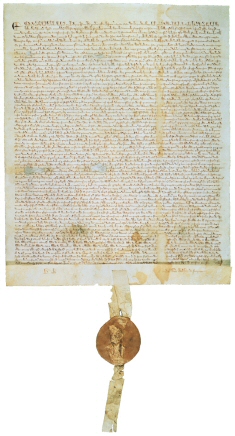 The Magna Carta (Latin for ‘Great
Charter’) is Britain’s best known constitutional document. In 1215 feudal barons
forced the ‘tyrannical’ King John (1199-1216) to agree to a series of
concessions embodied in a charter which became known as the Magna Carta.
The Magna Carta (Latin for ‘Great
Charter’) is Britain’s best known constitutional document. In 1215 feudal barons
forced the ‘tyrannical’ King John (1199-1216) to agree to a series of
concessions embodied in a charter which became known as the Magna Carta.
Sixty-one clauses set out a clear expression of the rights of the community
against the Crown. The contents deal with the ‘free’ Church; feudal law; towns,
trade and merchants; the reform of the law and justice; the behaviour of royal
officials; and royal forests.
The King was forced to fix his seal to the Magna Carta in a meadow next to the
River Thames at Runnymede between Windsor and Staines. It is said that he
behaved pleasantly to the nobles at the time, but as soon as he returned to his
own chamber he threw himself on the floor in a mad rage.
Since that day the Magna Carta has become part of English Law and established
the important principle that the King is not above the law.
Original copies of the charter exist in Salisbury Cathedral, Lincoln Castle and
the British Museum in London.
How does Britain elect its
government?
![]()
Parliament, the law-making body of the British people, consists of three elements: the Monarchy, the House of Commons and the House of Lords. They meet together only on occasions of ceremonial significance, such as the state opening of Parliament, although the agreement of all three is normally required for legislation.
The House of Commons consists of 646
elected members called Members of Parliament or MPs. Its main purpose is to make
laws by passing Acts of Parliament, as well as to discuss current political
issues. Elections to the House of Commons are an important part of Britain’s
democratic system.
The House of Lords consists of around 700 non-elected members (hereditary
peers and peeresses, life peers and peeresses and two archbishops and 24 senior
bishops of the Church of England). Its main legislative function is to examine
and revise bills from the Commons. It also acts in a legal capacity as the final
court of appeal. The Lords cannot normally prevent proposed legislation from
becoming law if the Commons insists on it.
General elections are held after Parliament has been ‘dissolved’, either by a
royal proclamation or because the maximum term between elections - five years -
has expired. The decision on when to hold a general election is made by the
Prime Minister.
For electoral purposes Britain is divided into constituencies, each of which
returns one MP to the House of Commons. The British electoral system is based on
the relative majority method - sometimes called the ‘first past the post’
principle - which means the candidate with more votes than any other is elected.
All British citizens together with citizens of other Commonwealth countries and
citizens of the Irish Republic resident in Britain may vote, provided they are
aged 18 years or over and not legally barred from voting. People not entitled to
vote include those serving prison sentences, peers and peeresses who are members
of the House of Lords, and those kept in hospital under mental health
legislation. Voting is by secret ballot. The elector selects just one candidate
on the ballot paper and marks an ‘X’ by the candidate’s name. Voting in
elections is voluntary. On average about 70 per cent of the electorate votes.
Any person aged 21 or over who is a British citizen or citizen of another
Commonwealth country or the Irish Republic may stand for election to Parliament,
provided they are not disqualified. People disqualified include those who are
bankrupt, those sentenced to more than one year’s imprisonment, members of the
clergy, members of the House of Lords, and a range of public servants and
officials. Approved candidates are usually selected by their political party
organisations in the constituency which they represent, although candidates do
not have to have party backing.
The leader of the political party which wins most seats (although not
necessarily most votes) at a general election, or who has the support of a
majority of members in the House of Commons, is by convention invited by the
Sovereign to form the new
government.
What are the origins of the names of the main political parties?
The Conservative and Unionist Party dates back to the Tory Party of the late eighteenth century. This broadly represented the interests of the country gentry, merchant classes and official administerial groups. After Britain’s 1832 (electoral) Reform Act, members of the old Tory Party began forming ‘conservative associations’. The name Conservative was first used as a description of the Party in the Quarterly Review of January 1830 - ‘conservative’ because the Party aims to conserve traditional values and practices. The Conservative Party today is the leading right-wing party. The term ‘Tory’ is still used today to refer to somebody with conservative political views.
The original title of the Labour Party, the Labour Representation Committee, makes the origins of the party clear - to promote the interests of the industrial working class. In 1900 the Trades Union Congress co-operated with the Independent Labour Party (founded 1893) to establish The Labour Representation Committee with Ramsay MacDonald as First Secretary. This took the name Labour Party in 1906.
The Liberal Party emerged in the mid-nineteenth century as a successor to the historic Whig party. ‘Whig’ was originally a Scottish Gaelic term applied to horse thieves! In the late eighteenth century the Whig Party represented those who sought electoral, parliamentary and philanthropic reforms. However, the term ‘Whig’ does not survive today. After 1832 the mainly aristocratic Whigs were joined by increasing numbers of middle-class members. By 1839 the term Liberal Party was being used, and the first unequivocally Liberal government was formed in 1868 by William Gladstone. In 1988 the old Liberal Party and the Social Democratic Party (SDP) merged into a single party called the Liberal Democrats.
How is the Speaker chosen?
|
The Right Honourable Michael John Martin (MP) the SHC in 2005 |
Contrary to what the title would imply, the Speaker of the House of Commons does not speak - that is, he or she does not make speeches or take part in debates. The office has been held continuously since 1377 and originally the Speaker spoke on behalf of the Commons to the Monarch. That role is now largely ceremonial and today the Speaker’s central function is to maintain order in a debate, and he or she may not vote other than in an official capacity - that is when the result of a vote is a tie. Even then, he or she is not allowed to express an opinion on the merits of the question under debate and must vote in such a way as to give the House another chance to decide.
The Speaker has three deputies - the Chairman of Ways and Means and his or
her two Deputy Chairmen. Like the Speaker, they can neither speak nor vote other
than in their official capacity. The Speaker is not a Minister nor a member of
any political party. He or she is still a Member of Parliament, representing a
constituency and the constituents’ interests.
The choice of Speaker is by election, with Members of Parliament each having one
vote. Though the Cabinet and Prime Minister will often be known to favour a
particular candidate when a vacancy occurs, support from backbench MPs is vital.
In 1992 Betty Boothroyd was elected in a contest with the former Cabinet
Minister, Peter Brooke. Usually a Speaker is elected by his or her fellow MPs
without opposition.
What is a ‘whip’ in Parliament?
The term ‘whip’ is said to owe its origin to the ‘whippers-in’ - people who
keep the hounds in order at fox-hunting meets. Parliamentary whips are supposed
to be similar disciplinarians, controlling the pack of MPs in their party!
Government whips are all Ministers of the Crown. The principal task of the Chief
Whip is the management of government business in the House. He or she must try
to ensure that, in spite of the activities of the opposition, Parliament has
passed all the legislation and done all the tasks which it had planned during
that session.
Whips in the two main parties are organised by subject and by region. They
monitor opinions inside their party and report back to the leadership,
maintaining valuable day-to-day contact between ministers and their backbench
supporters.
‘The Whip’ also refers to a document sent out weekly to MPs detailing the
forthcoming business of the House. Items are underlined once, twice or three
times to indicate their importance to the party leadership. When a ‘three-line’
whip is issued, the leadership is letting MPs know that it expects them to turn
up and vote on the matter under discussion!
The
Though
§ The
legislative power lies with the Parliament.
§ The
executive power
consists of the
Government and
ministerial departments.
§ The
judiciary power: There
is a major reform process of the judicial system of the UK (2005-9) which has
undertaken to remove the “court of last resort” status from the Law Lords (in
the House of Lords) and from the
Judicial Committee of the Privy Council creating a new and separate
Supreme Court of the United Kingdom which
will have the ultimate say in judiciary decisions in the country.
§ Until the Constitutional Reform Act comes into force the present system will carry on exercising the judicial powers.
The Monarch’s Role in
Government
In law, the Monarch
is:
§
An integral part of the legislature
who summons (összehív), prorogues (berekeszt, elnapol), dissolves (feloszlat) Parliament and signs Bills passed by the UK Parliament, Northern Irish Assembly
and Scottish Parliament (this is how a Bill (törvényjavaslat) becomes an Act of
Parliament - törvény)
§
Head of the executive
(Government)
§
Head of the judiciary
§
The commander-in-chief of all the armed
forces of the Crown
§
The ‘supreme governor’ of the established Church of
Until
1999 legislation in the
Transferring power from
The reserved
powers are:
§
§
Foreign
policy
§
Economic and Fiscal policy (gazdasági és költségvetési
politika)
§
Social security + employment (társadalombiztosítás és
foglalkoztatás)
§
Defence policy (honvédelem)
§
Common markets
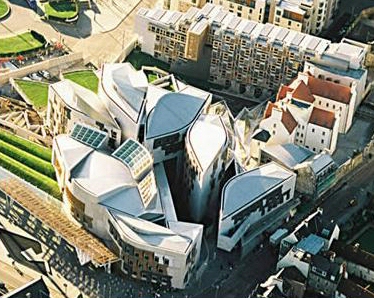 The
Scottish
Parliament
(in
The
Scottish
Parliament
(in
§
Local government (e.g. local transport)
§
Tax raising power
§
Health policy
§
Education
§ Legal system
§
Judicial system
§
Environment
§
Agriculture
§ Policing
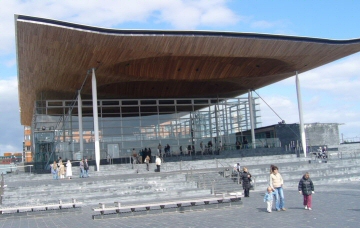 The
current powers of the
Welsh Assembly
(in
The
current powers of the
Welsh Assembly
(in
§
Same as in
§
Local
taxation (not de facto taxing power but indirectly such as establishing the charges
for
government services: prescription charges (much less than in other parts of
the
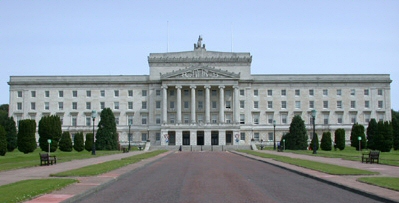 The powers delegated
to the
Northern Irish Assembly (
The powers delegated
to the
Northern Irish Assembly (
§ Over
domestic affairs same as in
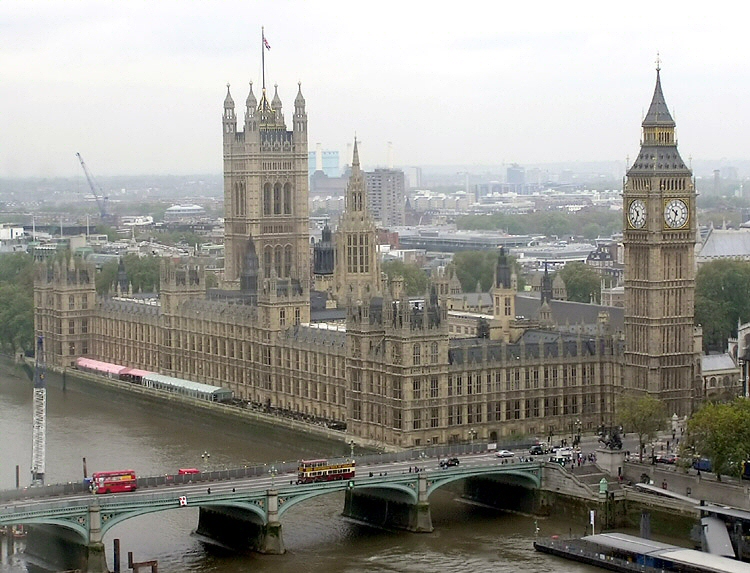
|
|
The UK Parliament
comprises the Sovereign
(Elizabeth
II;
1952 - ), the House of Lords, and the House of Commons.
The Sovereign is an integral part of the legislature:
§
Summons,
prorogues, and
dissolves
the Parliament
§
Signs Bills passed by the UK
Parliament, Northern Irish Assembly and Scottish Parliament (this is how a
Bill
(törvényjavaslat) becomes an
Act of Parliament - törvény)
The House of Lords:
Upper House of Parliament ![]() I
I ![]()
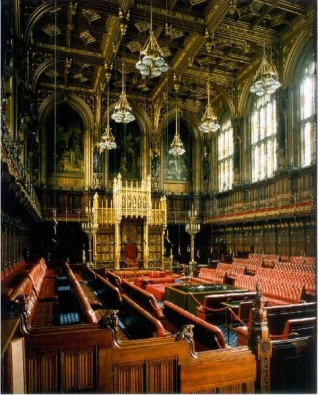 § Location:
§ Location:
§ Its 724
members are not elected but
appointed:
ú 26
Lords Spiritual: 2 archbishops and 24 bishops
of the established Church of England (Anglican Church)
ú 699 members of the Peerage ("Lords Temporal").
§ Only delaying power: Suspensive
veto in the legislative process, to delay bills (törvényjavaslat) passed by
the House of Commons for 12 months.
After the 12 months are up the bill will automatically go on to the
Sovereign to be signed and will become a law (Act of Parliament).
§
The House of Lords used to be one of the
courts of last resort (~legfelsőbb bíróság) along with the Judicial Committee
of the Privy Council . In accordance
with the Constitutional Reform Act of 2005, however, judicial functions of the
Lords are transferred to a new Supreme Court of the
§ The House is presided over by the Lord
Chancellor, who sits on the woolsack and acts as Speaker of the House.
§ Members of the House of Lords receive no salary
for their parliamentary work, but can claim for expenses incurred in attending
the House (for which there are maximum daily rates) and certain travelling
expenses.
§ Average daily attendance in the Upper House
is about 350 Members.
The House of Commons: Lower House
of Parliament ![]() I
I ![]()
§ Location:
|
What are the red lines on the carpet in front of each set of benches for?
Interesting Fact: |
§ It is
the dominant branch of the
legislative
§ Consists of 646 elected Members of Parliament (MPs)
§ Members are elected by the first-past-the-post system (see: Elections) to serve (maximum) 5 year terms – unless the House of Commons is dissolved earlier.
§ (Sometimes the prime minister will choose to
have the House dissolved earlier if his/her
approval rating is high in order to ensure success at the elections. This happened for instance in 2005 under Tony
Blair and in 1983 under Margaret Thatcher.)
§ Of the 646
seats: 529 represent
constituencies in England, 40 in Wales, 59 in Scotland, and 18
in Northern Ireland.
§ The chief
officer of the House of Commons is the
Speaker, elected by MPs to preside over the House. As in the Hungarian Parliament, the Speaker
neither speaks nor votes except in his/her official capacity.
§
Bills
may
originate in both Houses, however they are hardly ever introduced in the Upper
House. Only the House of Commons may
introduce bills concerning taxation.
§ There a number of Parliamentary committees (some 30 standing committees – állandó bizottság) which review bills in detail and produce reports, make recommendations and amendments. Among the most important ones are the Treasury Committee which scrutinises public spending, The Liaison Committee which comprises all the chairmen of the select committees in the House of Commons and decides which select committee reports the House of Commons should be debating.
Before a
proposal for a new law starts its progress through Parliament, there will have
been much discussion. If it is a
government proposal, Green and White Papers are published, explaining the ideas
behind the proposal. After this, lawyers draft the proposal into a bill. Most bills begin life in the House of
Commons, where they go through a number of stages
|
First reading Formal announcement with no debate. |
|
ê |
|
Second reading The House of Commons debates the general principles of the bill and, in most cases, takes a vote. |
|
ê |
|
Committee stage A committee of MPs examines the details of the bill and suggest changes (amendments). |
|
ê |
|
Report stage The House of Commons considers the amendments. |
|
ê |
|
Third reading The amended bill is debated as a whole. |
|
ê |
|
House of Lords The bill is sent to the House of Lords, where it goes through the same stages. It the House of Lords make further amendments the bill goes back to the House of Common.* |
|
ê |
|
Royal assent After both Houses have reached agreement, the bill receives (practically automatically) the Royal assent. |
§ Prime Minister’s Question Time:
![]()
This is the most well-attended, and usually the noisiest,
part of the parliamentary day. For about an hour there is no subject for debate. Instead, MPs are allowed to ask questions of
government ministers. In this way they can, in theory at least, force the
government to make certain facts public and to make its intentions clear.
Opposition MPs in particular have an opportunity to make government ministers
look incompetent or perhaps dishonest.
The questions and answers, however, are not spontaneous. Questions to ministers have to be 'tabled' (written down and placed on the table below the Speaker's chair) two days in advance, so that ministers have time to prepare their answers. In this way the government can usually avoid major embarrassment.
The trick,
though, is to ask an unexpected
'supplementary' question. After the
minister has answered the tabled question, the MP who originally tabled it is
allowed to ask a further question relating to the minister's answer. In this
way, it is sometimes possible for MPs to catch a minister unprepared. Question time has been widely copied
around the world. It is also probably the
aspect of Parliament most well-known among the general public. The vast majority of television news excerpts
of Parliament are taken from this period of its day. Especially common is for the news to show an
excerpt from the half-hour on Wednesdays when it is the Prime Minister's turn to
answer.
§ Members are paid an annual salary of
£51,822 + travel allowances + allowances for
subsistence and for second homes nearer to the Palace of Westminster + up to
£70,000 for staff salaries and £18,000 for incidental expenses
(mellékköltségek). (![]() In
In
§ The Commons has
a public register of MPs’ financial interests. Members with a financial interest
must declare it when speaking in the House or in Committee and must indicate it
when giving notice of a question or motion.
MPs cannot express favourable views in the House on matters which are related to
the source of any personal financial interest.
General Elections (országgyűlési
választások) are held after a Parliament has been dissolved and a new one
summoned by the Sovereign (uralkodó). It is the Prime Minister who normally chooses
the timing of dissolutions (feloszlatás), or, in other words, the timing of
general elections. Logically the
circumstances will favour the political interests (party) of the Prime
Minister. The last general elections were held in May 2005 though they were not
“due” until 2006.
How many Members of Parliament (MPs) are elected at British general
elections?
§ There are
646
constituencies in the ![]()
§ To ensure that constituency electorates are
kept roughly equal, four permanent Parliamentary
Boundary Commissions, one
each for
First past the post system (FPTP)
§ The
FPTP voting system is also known as the plurality voting system (relatív
többség) or the
winner-take-all
voting. The name is actually misleading
in that there is no “post” or number that the winning candidate must reach and
pass in order to win. The candidate who
gets the highest number of votes is then (“given all the votes” from that
constituency) declared the exclusive winner of that particular constituency.
§
The objective of this electoral system is to
ensure a strong
government. In countries where
FPTP voting system is
practiced, such as the
§ In the General Elections of 2005
the Labour Party received 35% of the votes (popular vote), which was only 3% more than
what the Conservatives got with their 32%, and yet the Labour Party was “given”
55% of the seats (356) while the
Conservative Party received 198 seats (30%)!
The biggest “loser” of the FPTP system is the third party, the Liberal
Democrats. They received an impressive
22% of the votes cast and yet were allotted only less than 10%, that is 62
seats. It is no wonder that electoral
reform is high on the agenda of the Liberal Democrats, who are calling for the
replacement of FPTP (or the winner-take-all system) with the much more
democratic Proportional Representation system.
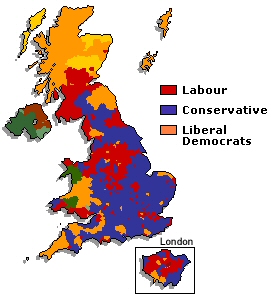
|
|
Share of seats |
Share of
vote |
MPs
elected |
|
|
Labour |
55% |
35% |
356 |
|
|
Conservative |
30% |
32% |
198 |
|
|
Liberal Democrats |
10% |
22% |
62 |
|
|
Scottish National |
1% |
1,5% |
6 |
|
|
Plaid Cymru |
0,5% |
0.6% |
3 |
|
|
|
0,2% |
0.5% |
1 |
|
|
Democratic Unionist |
1,4% |
1% |
9 |
|
|
Social Democratic and Labour |
0,5% |
0.5 |
3 |
|
|
Sinn Fein |
0,8% |
0.6 |
5 |
|
|
|
|
|
|
|
|
Others |
0,4% |
0,6% |
3 |
Who can vote?
§
British citizens
§
Citizens of other Commonwealth countries and
§
Citizens of the
ú Aged 18 or over
ú Included in the register of electors for the
constituency
ú (Not subject to any legal incapacity to vote)
Who can be nominated for election in
§
British
citizens (min. 21 years old )
§
Commonwealth
citizen
§
Citizen of the
§
Anyone can
become a candidate (választásra jelölt) who is nominated by 11 registered
electors (választási nyilvántartásba vett választópolgár) from the local
constituency (helyi választókerület).
Candidates do not have to belong to any political parties.
(![]() In
In
§
The maximum sum a candidate may spend on a
General Election campaign is £5,483 plus 6.2 pence for each elector in the constituency.
New
measures to help modernise
voting and registration procedures for
(These measures were first implemented for the General Election held in June 2001)
§
The right for electors to cast their vote by post if they find that method more
convenient;
§
A new rolling register, updated monthly, to enable voters to register
at any time of the year (replacing the one which was previously updated once a
year)
§
Improved access and facilities for disabled voters (ie. a large print version
of the ballot paper and a template for blind voters); and easier registration
for homeless people (who were
previously barred from voting because they had no fixed address.
§
Local authority (helyhatósági) pilot schemes (kísérleti
eljárás) to evaluate innovative
electoral procedures, such as:
ú electronic
voting
ú all-postal
ballots
ú early
and
weekend voting
ú mobile polling
stations (mozgó szavazóhelyiség)
For the last 150
years


Leader: Tony Blair
The Labour Party's victory headed by Tony Blair ended 18 years of Conservative government.
Tony Blair is the longest-serving Prime Minister of the Labour Party as well as the youngest Prime Minister, he was 44 in 1997 (since Lord Liverpool in 1812, age 42).
Successes since 1997
§
The lowest inflation (for 30 years!)
§
The lowest mortgage rates (for 40 years)
§ Highest number of people in work
§
§ Spending on the National Health Service (NHS) was increased: Hospital waiting lists are at their lowest since 1987 + number of doctors and nurses has been increased
§ Spending on education was increased: number of teachers has been increased ® primary school results have improved
§ Number of policemen has been increased considerably
§
Energy
allowance for pensioners during the winter was introduced
§ Tax credits given to those with below-average incomes
§
Surestart: a
government program helping
families with young children especially in disadvantaged areas
Controversial acts
§
Benefit cuts to lone parents
§
Introduction of tuition fees for university: top-up fees up to £3,000, grants
promised to poorest students (without a debate in the Labour Party!!)
§
Deregulation of utilities
§
Outsourcing
government services
§
Other policies
§
Reduce asylum numbers by tougher rules on settlement and more deportations;
electronic register of all crossing borders; skills-based points system for
permanent immigrants.
§
Universal, affordable and flexible childcare for parents of all 3 to 14
year-olds; a Sure Start children's centre in every area; extend maternity pay from
§
Allow civil-union of homosexual couples
§
Further reform of the House of Lords
§
Establishment of an independent New Supreme Court
![]() Conservative
and Unionist Party - 198 MPs (30 %)
Conservative
and Unionist Party - 198 MPs (30 %)
Centre-right party (in government for most of the 20th century)
 Leader:
David Cameron
Leader:
David Cameron
Policies:
§
Cutting taxes on employment and wealth creation in order to enhance the
economy's competitiveness
§
Reduce government intervention
in the economic sphere (Free market philosophy)
§
Make the House of
Lords a mostly-elected chamber
§
Increase government intervention in
certain aspects in the social and cultural sphere in defence of the traditional family (e.g. Section 28 of the Local Government Act 1988, which outlawed
"the teaching in any maintained school of the acceptability of homosexuality
as a pretended family relationship")
§
Paid maternity
leave extended to 9 months, or higher pay for 6 months; £50/wk childcare subsidies for all with
children under 5; replace child tax credits with tax allowances.
§
In favour of fox-hunting
§
Against converting the NHS to an insurance based system
§
Patients able to choose hospitals or take 50% of NHS
operation price to go private
§
Would
keep tuition fees (introduced by the
Labour Party) in university
§
Restrictions on immigration (yet
the party’s 1st black MP was elected in 2005):
Annual refugee and
immigrant quotas; compulsory health checks;
offshore asylum processing centres; new border police; quit UN refugee convention
§ Euroscepticism:
1. Opposition to the Schengen Agreement (which would mean common EU immigration policy + no border checkpoints
within the EU);
2.
Opposition to the
Monetary Union: the introduction of the Euro in the
§
Strong Atlanticist
foreign policy: especially with the
§
In favour of the Iraqi War
 Liberal Democrats - 62 MPs (10 %)
Liberal Democrats - 62 MPs (10 %)
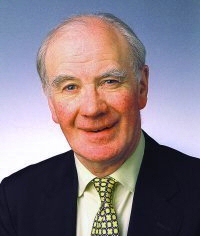
Leader: Menzies Campbell
Policies:
§
Support civil liberties (freedom of
speech, religion, assembly, right to privacy, etc.) e.g. against anti-terror laws
(detention without trial)
§
Referendum on electoral reform; extend vote to 16 year-olds; make House of Lords
elected chamber; Proportional Representation for local elections; more powers
for Welsh, NI Assembly
§
Want a written Constitution
§
Support the decentralisation of power to the lowest possible level
§
Support "free education for all" and propose to abolish university
tuition fees
§
Maternity
pay of £170 per week for first 6
months; create Early Years Centre for pre-school
education
§
NHS: Reduce
diagnostic waiting lists for tests;
free long term care for elderly;
free eye tests, drugs for long-term illnesses; ban smoking in public places
§
Support anti-discrimination laws (protection of lesbians and gays)
§
In favour of full
§
Increasing the top rate of income tax by 10 percent to 50% for
those earning over £100,000 to fund increased public spending plans
(increase the tax of the wealthiest)
§
Back
common EU asylum policy: allow asylum
seekers to work so they don't rely on benefits; quota for immigrant workers
from outside EU.
§
Opposed to
![]() RESPECT
the unity coalition - 1 MP
RESPECT
the unity coalition - 1 MP
Policies:
§
Renationalisation of the railways
and other public services
§
Opposition to the privatisation
of the National Health Service
§
Opposition to university
tuition
fees
§
Support for pensions
increases linked to average earnings
§
Raising the minimum
wage
to the European Union's "decency
threshold" of £7.40/hour
§
An increase in income
taxes on the rich to fund social
welfare programs
§
The defence of the rights of refugees and other asylum-seekers
§
Opposition to the "stability
pact" that the E.U. seeks to impose on all those who join
the euro
§
Support for the Palestinian
people
§
Support for the British environmental movement
 Party
of Wales (Plaid Cymru) - 3 MP
Party
of Wales (Plaid Cymru) - 3 MP
Nationalist political party in Wales
•
Policies:
§
Used to
advocate the independence of Wales from the
United Kingdom,
but it no longer does
§
One its main
objective: promote the
Welsh language and culture
§
Supported
mainly in the Welsh-speaking areas of
north and
west Wales.
In the UK 2005 general election the party's share of the vote in Wales was 14%,
that meant 3 out of 40 Welsh seats in Westminster.
§
Plaid Cymru
has 12 of 60 seats in the
National Assembly for Wales,
and control of 1 of 22 Welsh
local authorities.
§
The party has
adopted a quasi-socialist
platform and called for the withdrawal of troops from
Iraq.
 Scottish National Party or SNP - 6 MP
Scottish National Party or SNP - 6 MP
Centre-left party
Policies:
§
Main
opposition party of the Labour Party in the Scottish Parliament (since 1999)
§
Wants independence for
§
Supports the introduction of the Euro
(instead of the present Pound Sterling)
§
Close links in
§
Next elections for the Scottish Parliament: 2007
§
Renationalisation
of the railways
§
Increase the pay of healthcare
workers
§
Wants a Nuclear-free
 Democratic Unionist Party (
Democratic Unionist Party (
Hardline Unionist party (wanting
to keep the
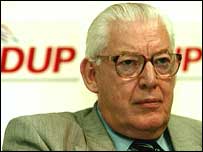 Leader and founder: Ian Paisley
Leader and founder: Ian Paisley
§
Rival of the
other unionist party: Ulster Unionist Party
§
Participated
in the negotiations leading to the
§
The strongest
political party in
DUP insists on:
§ Total decomissioning of the IRA (with a testing period) Otherwise will not admit Sinn Féin into the future coalition government
§ Will not allow for Sinn Féin to give the Policing and Justice Minister to the future NI Cabinet
§ Will not allow terrorists in government (reference to Gerry Adams and .......... in Sinn Féin)
§ All significant future agreements will have to gain Unionist support
 Sinn Féin (
Sinn Féin (
Republican party in

Leader: Gerry Adams (since 1983)
§ Irish nationalist party campaigning for the unification of Ireland into a single Republic (= republican)
§ Largest party representing the nationalist (Catholic) community (having overtaken SDLP in 2004 after succeeding in ending the IRA campaign of violence, the armed struggle)
§ Sinn Féin is called Provos by the Protestants
§ Abstentionism: Sinn Féin does not take its seats in Parliament because of their refusal to take the oath (which involves acknowledging The Queen) as well as because they pledged not to take their seats in Westminster
§ Closely associated with the "demobilised" Provisional IRA (political wing of the IRA)
§ Several Sinn Fein party members have been members of the IRA, for example the former education minister Martin McGuinness
§ Advocate socialist values
§ Sinn Féin had two ministers in the now suspended Executive Committee (cabinet) of the Northern Ireland Assembly but has never sat in cabinet in the Republic: Martin McGuinness (Education Minister) and Bairbre De Brun (Health Minister)
|
Stormontgate (The Irish Watergate) The Northern Irish Assembly was suspended over a supposed IRA espionage ring 'discovered' at Stormont (home of the NI Assembly) in October 2002. Three IRA men were charged with gathering intelligence on the Protestant politicians (a list of their addresses and phone numbers, etc. This information had been top-secret to protect the lives of the families of the Protestant politicians from a possible IRA attack). 10 days afterwards the NI assembly was suspended. It was only in December 2005 that all charges were dropped against the 3 Sinn Féin "spies". The secret intelligence service that raided the offices of Sinn Féin in Stormont obviously lied about finding a list of classified addresses! There were no such lists. Despite this embarrasing turn of events, both the Irish and British governments have ruled out inquiries into the "controversy"!! To make things worse for the British intelligence it also came to light that not only did they raid the Sinn Féin offices in Stormont as part of a political plot to discredit Sinn Féin, but they had been paying a spy to infiltrate Sinn Féin for the past 20 years in the person of Denis Donaldson (one of the three alleged IRA men charged with intelligence gathering...). At first the British intelligence service (called M15) denied allegations of Donaldson being their spy, but then Donaldson himself confirmed that in fact he had been a British informer. (He moved to the Republic of Ireland after this "incident" and was found shot dead in April 2006). On 8 December 2005 lawyers for the Northern Ireland Public Prosecution Service said that "the prosecution for the offences in relation to the accused are no longer in the public interest". |
 Social Democratic and Labour
Party or SDLP (
Social Democratic and Labour
Party or SDLP (
Constitutional nationalist party in
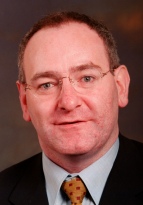
Leader: Mark Durkan
§ SDLP is the smaller of the two majornationalist (Catholic) parties inNorthern Ireland.
§ The party currently has 3 MPs in theHouse of Commons, and 18 MLAs in the Northern Irish Assembly
§ Aims: To satisfy nationalist (Catholic) desires and calm unionist (Protestant) fears. The SDLP were the first to advocate the so-called principle of consent - recognising that fundamental changes in Northern Ireland's constitutional status could only come with the agreement of the majority of the people of Northern Ireland.
§ The former SDLP leader John Hume received the joint Nobel Peace Prize for his role in the Northern Irish Peace Process that led to the Good Friday (Belfast) Agreement in 1998.

moderate unionist (Protestant) party
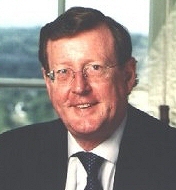
Former leader: David Trimble (see picture) who was the 1st First Minister of the devolved Northern Irish Assembly. He received the 1998 Nobel Peace Prize (with John Hume, SDLP) for his role in finding a peaceful solution to the Northern Irish conflict ('The Troubles'). The NI Government was suspended from Febrary-May 2000, then from July-November 2001 and again since October 2002 as a result of the Stormontgate Affair (see above). At the General Elections of 2005 David Trimble lost his seat to an SDLP politician, after which he decided to resign as the leader of UUP. The new leader of the party is Reg Empey.
§ Pro-devolution with a strong attachment to British Parliamentary Traditions
§ Seeks the restoration of the Stormont Assembly
§ Supports power-sharing with democratic nationalist parties in Northern Ireland
§ Supportive of a positive, co-operative relationship between Northern Ireland and the Irish Republic
§ Supports strong UK anti-terrorist legislation, identity cards, anti-social behaviour orders and statutory Victims Charter for victims of crime
§ Demands Assets Recovery Agency actions against loyalist and republican paramilitaties
§ Demands abolition of Parades Commission
§ The party promotes a series of measures to reduce the "brain drain" of educated young Northern Irish people
Political parties: distribution of seats in different governing bodies
|
House
of Commons (646) : |
Labour (356) Conservatives (197) Liberal Democrats (63) DUP (9) SNP (6) Sinn Féin (abstentionist) (5) |
Plaid Cymru (3) SDLP (3) Ind KHHC (1) Respect (1) UUP (1)
Vacant (1) |
|
Scottish
Parliament (129): |
Labour (50) SNP (27) Conservative and Unionists (17) Liberal Democrats (17) |
Scottish Senior Citizens Unity Party (1)
Independent (5) |
|
Welsh
Assembly (60): |
Labour (29) Plaid Cymru (12) Conservatives (11) |
Forward Wales (1)
Vacant
(1) |
|
DUP (32) UUP (25) Sinn Féin (24) SDLP (18) |
Alliance (6) UKUP (1)
Independent (2)
|
|
|
London
Assembly (25): |
Conservatives (9) Labour (7) |
Greens (E&W) (2)
One London (2)
|
|
European
Parliament (72 out of 732): |
Conservatives (ED, 26) Liberal Democrats (ELDR, 12) Greens (E&W) (EGP, 2) |
DUP (EUD1, 1) Plaid Cymru (EFA, 1)
Independent (2) (Ind) |
The
Cabinet:
§
Made up of about 20 ministers chosen by the Prime Minister
§
There are departmental and non-departmental (tárcanélküli) ministers
§
Meets weekly (when Parliament is in session)
§
Collective responsibility: every
member of the Cabinet has to support government policy once it has been decided
in an issue. If a minister cannot support the policy he/she is expected to resign! (Except for a very few cases when ministers
are allowed to vote freely.)
§
Ministers
(often called Secretaries of State, or some other title) have to assume
individual responsibility for the work of their departments firstly to the
Prime Minister then to Parliament.
§
No
minister can be the director of any private or public company or be in any way
involved that would be conflicting with their public duties.
§
Most
important ministers: Prime Minister, Chancellor of the Exchequer, Foreign
Secretary and Home Secretary.
The Prime Minister:
§
First Lord of the Treasury
§
Minister of the Civil Service
§
Appoints and dismisses the
ministers
§
He is the head of the Government: in charge of the Cabinet
§ Makes the “recommendations” to the Monarch concerning the appointments of:
ú Lord
Chief Justice
ú Archbishops,
bishops, deans of the Church of England (political appointments!!)
ú Privy
Counsellors
ú Lords
Lieutenants
ú University
rectors and deans
ú The
Poet Laureate
ú BBC
board members
ú Etc… (The PM has an impressive say in picking the key persons of the country, doesn’t he/she? The winner really “takes it all”.)
§
Informs the Sovereign of the dealings of the Government
Chancellor or the Exchequer (Pénzügyminiszter):
§
The most powerful minister after the Prime
Minister.
§
His official residence is
§
He is
responsible for all financial matters.
Every year he formulates the Budget which will define government
spending for the following fiscal year.
§
There are
much
fewer local councils in England and Wales than in
§ Councillors are elected for 4 years in England and Wales and 3 years in Scotland. Local councillors, although they spend on average 25 hours a week on council business, do not get paid (unlike the Members of Parliament), they only get reimbursed for certain expenses.
§ Councils are headed by a mayor of chairman who belongs to the majority politiacal party of the council.
§ Local governments are the largest employers, giving 2.3 million jobs in England and Wales (e.g. 58% are teachers and support staff, 14% are social workers)
§
Local
governments in
§ Scottish, Welsh and Northern Irish local governments deal with the devolved Parliament and Assemblies in their respective countries
§ The expenses of mandatory functions and discretionary functions are covered mostly by the central government, business rates and council taxes (only 26% of all costs are covered by council tax).
§
Mandatory functions: services that are required by law
§
Discretionary
functions: services not required by law,
yet offered by the local government
§
§ Depending on the financial situation of the people pertaining to a local council there can be big differences in the quality and quantity of services offered by the local government. (Higher income from local taxation leads to higher demands and spending.)
|
statute law |
írott jog |
|
common law |
szokásjog, polgárjog |
|
conventions |
egyezmények, szokások |
|
legislative power |
törvényhozó hatalom |
|
executive power |
végrehajtó hatalom |
|
government / local government |
kormány / helyi önkormányzat |
|
ministerial departments |
minisztériumok |
|
judiciary power |
bírói hatalom / igazságszolgáltatás |
|
Judicial Committee of the Privy Council |
Királyi Titkos Tanács Ítélőszéke |
| constituency | választókerület |
| Member of Parliament | országgyűlési képviselő |
| summon | összehív |
| prorogue | berekeszt, elnapol |
| dissolve | feloszlat |
| Bill | törvényjavaslat |
| Act of Parliament | törvény |
| approval rating | népszerűségi mutató |
| Speaker | képviselőház elnöke |
| amendment | itt: törvényjavaslat módosítása ill. kiegészítése |
| Treasury Committee | Költségvetési Bizottság |
sources:
National Statistics, UK 2002, The Official Yearbook of Great Britain and Northern Ireland
Wikipedia: Politics of the UK, UK General Elections 2005
James O'Driscoll: Britain Oxford University Press 1997
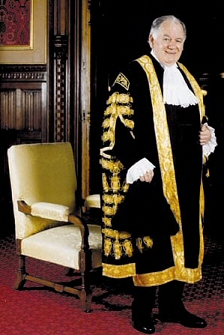
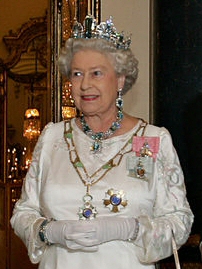
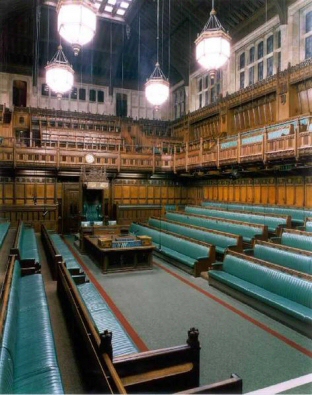 MPs
hold most of their debates in the House of Commons Chamber. The
Speaker, who controls proceedings, sits on a raised chair at one end of
the Chamber. In the photograph, you are looking towards the Speaker. The
MPs
hold most of their debates in the House of Commons Chamber. The
Speaker, who controls proceedings, sits on a raised chair at one end of
the Chamber. In the photograph, you are looking towards the Speaker. The